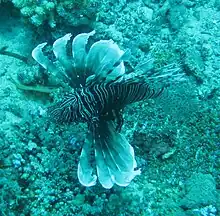Pemba Island is an island forming part of the Zanzibar Archipelago in Tanzania, located approximately 50 km north of Zanzibar (locally Unguja), the largest island in the archipelago and main visitor destination. Visitors to Pemba however with find a dramatically different experience from the increasingly touristy and resort-developed Unguja, as Pemba has managed to maintain a strong sense of traditional identity within relative isolation.
Cities
- 🌍 Chake Chake - Largest city on the island, located approximately 7 km from Pemba's primary airport
- 🌍 Wete
- 🌍 Mkoani
- Konde
Other destinations
- Misali Island
Understand
Though very much overshadowed by the larger and far more popular Unguja to the south, Pemba is an extraordinary destination for its natural beauty (during the Omani Sultanate period it was referred to as "The Green Island") and relatively undisturbed authentic Swahili culture. There is very little tourism infrastructure here, and apart from a few lodges on the north end of the island there are no accommodations geared towards foreign travellers. Refreshingly this all means there are almost no touts and tourist traps like the multitude to be found on Unguja, making it the perfect destination for genuine cultural exploration. The island overall is conservative in its culture and adherence to Islam, hence it is recommended to dress modestly when in public and be respectful of local customs. Otherwise the people of Pemba are fantastic and welcoming and it is guaranteed that visitors will have a unique and memorable experience.
Talk
As part of the Zanzibar Archipelago and the cradle of Swahili culture, the Swahili language (kiswahili) is the native language of the entire population of Pemba Island. Few people outside of the lodges are able to speak English beyond a basic level, and thus it is highly recommended that visitors learn some Swahili and carry a phrasebook. The relative isolation of the island is also reflected in the language, as far fewer English loan words are used (as compared to the Swahili of Nairobi or even Dar es Salaam) and traditional religious greetings such as Asalam Aleikum and Waaleikum Salam ("peace be upon you") are typically used.
Get in
The airport (PMA IATA) approximately 7 km from Chake Chake is served local airlines with daily flights to Zanzibar and Dar es Salaam on small Cessna-type aircraft. Flight from Zanzibar takes about 30 mins. Ferries are available to the port town of Mkoani on the south side of Pemba Island from Dar es Salaam via Stone Town in Unguja as well as to Tanga on the northern Tanzanian mainland. Azam Marine operates the most professional and safest vessels, charging US$75 and arriving to Mkoani in seven hours from Dar es Salaam, US$35 and five hours from Stone Town, and US$35 in two hours to Tanga. Do be aware that these ferries only run a few times a week, so it is necessary to check their timetables while also expecting that these ferries will likely depart later than their scheduled times.
Get around
Daladala (public minibuses) are ubiquitous along the main roads of Pemba and generally the easiest (and certainly the cheapest) way to get around. Dala dalas run frequently between the main cities on the island picking up and dropping off passengers along the way, and rarely cost more than a few thousand shillings.
It is also possible to find taxis (best arranged through your accommodation) though you will typically pay around 10x the fare of a dala dala while likely getting there in the same amount of time. Renting bicycles is also possible and a fun way to see the small towns of the island.
See

The best beaches (along with the foreigner lodges) are found on the north side of the island. Forest reserves with endemic animals including the Pemba Flying Fox can also be found in the north. It is also possible to arrange spice tours to visit farms where cloves are grown (the main economic export of the island).
Do
Pemba is one of the diving jewels of the east of Africa. There are at least two dive operators (Swahili Divers and Manta Reef) operating under the PADI and BSAC codes that serve visitors. Divers' highlights include: Extensive plate coral gardens on the west coast which make for a world class drift dive and the marine reserve surrounding Misali Island. The annual whale migration is in July and August when humpback whales can be seen off the east coast of the island.
Eat
While there are few formal restaurants in Pemba, most lodges (catering to locals or foreigners) operate restaurants with traditional Swahili food cooked to order. This will likely include a delicious selection of rice, curries, chapati (Indian flatbread), and seafood. Street food is also widely found along the roads of the main towns, and largely consists of chips and grilled meats. Be sure not to miss out on the fresh fruits, in particular mango and passion fruit, which are commonly found at street stands or pressed into juices.
Drink
Alcohol will not be found outside of the few lodges catering to foreigners, due to Muslim custom.
Stay safe
Pemba is a very safe destination where visitors will be immediately drawn into the easy-going and relaxed nature of the local people.Since most of the island does not see very many foreigners, it is important to understand your presence as a visitor should be respectful of local customs (i.e. not drinking outside the lodges, wearing revealing clothing, or eating in public during Ramadan) and also be receptive to the genuine curiosity and friendliness one is likely to experience from the people on the island.
Go next